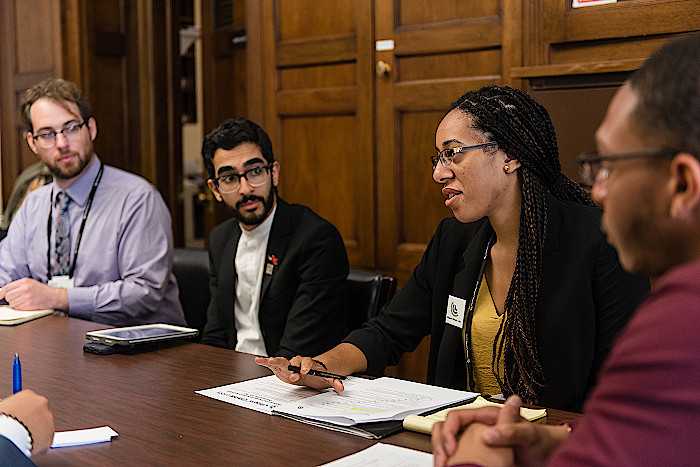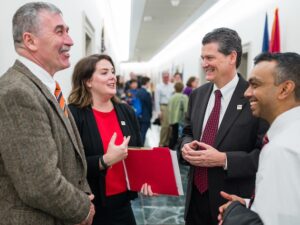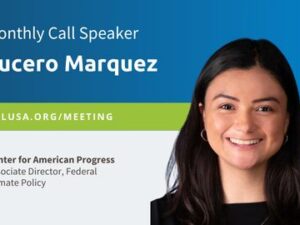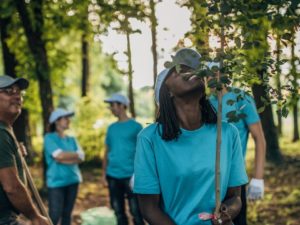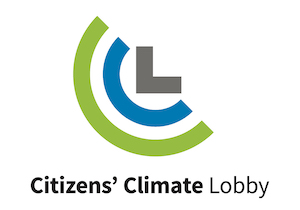CCLers excited for new advocacy possibilities after policy expansion
By Katie Zakrzewski
Since CCL announced our policy expansion at the December 2022 conference, many volunteers have expressed excitement about these fresh angles for effective climate advocacy with Congress and local communities.
Let’s take a look at the doors this policy expansion has opened.
Electrification and efficiency
For solar contractor Pete Marsh, CCL’s expansion toward building electrification and efficiency renewed his commitment to the organization.
“I was jumping up and down with excitement when I got the news because this policy expansion gave me an avenue to continue building up relationships for that cause,” Pete said.
Pete shared that as a result of this policy expansion, he felt reinvigorated to continue work at CCL.
“I stepped up as a chapter leader, and I’m co-leading an electrification team that includes CCL and other organizations,” Pete said. “Because an organization as respected as CCL with a huge volunteer base is moving in this direction, I feel like a lot of my efforts have been given a credibility boost with other organizations and citizens. I plan to continue building relationships with other electrification coalitions, such as Rewiring America.”
Robin Paone, co-leader of the Flathead Valley chapter in Montana, is also enthusiastic about electrification and efficiency.
“I am so excited to work with my chapter on electrification. Up here in Northwest Montana, we have 97% carbon-free power. Wouldn’t it be amazing if our chapter could help our community electrify everything and be nearly carbon-free? Our chapter electrification team, led by Bret Luedke, has already given a well-attended workshop. It’s going to be an amazing year!”
Permitting reform
CCLer Tom Calderwood of Los Gatos, California, joined CCL after retiring in 2019. He expressed excitement about permitting reform.
“It’s good to see permitting reform included. I think we need to make sure that the Inflation Reduction Act and infrastructure bills are implemented and that the results and benefits are publicized,” he said.
CCLer Mark Taylor echoed the importance of permitting reform to ensure the full impact of the Inflation Reduction Act.
“I understand how the current political reality caused this expansion. We’ve got to urgently facilitate the Inflation Reduction Act policies while maximizing all politicians to wade into the climate issue as deep as they can. We knew carbon fee and dividend was no silver bullet — just a big part of the buckshot.”
Jan Schaper, a seven-year CCLer and Arkansas state co-leader, shared her excitement for the expanded policy agenda as a way to engage conservatives in her state and climate-hesitant members of Congress.
“I’m delighted that we have the expanded policy agenda. I like to think of it as our supporting asks, but all grown up! Our members of Congress aren’t on board yet for carbon fee and dividend, which is the policy we really need to get emissions down,” Jan said. “Engaging our members of Congress on issues like permitting reform and healthy forests (via the farm bill) where they are more likely to lean in and hopefully cast ‘yes’ votes has multiple benefits: win for the climate and clean energy, win for the member of Congress, win for the member of Congress potentially taking more climate steps, and win for our volunteers’ morale!”
Healthy forests
Allison Fabrizio is a student at Washington University in St. Louis, in addition to being the CCL Climate Advocacy Fellow for the Tornadoes Region. She focuses much of her work on diversity, equity, inclusion, and justice and is especially interested in working toward this goal within the healthy forests policy expansion.
“I am interested in the new policies, especially the aspects that would affect how we approach marginalized communities. I am interested to see how the forestry policies will be used to better understand and advocate for accessible green spaces and tree equity,” Allison said.
As a sophomore at George Washington University and CCL’s Chapter Development Intern, Danielle Whyte is also excited about the healthy forests policy expansion.
“I’m particularly excited about the inclusion of tree equity. This mention of equity has the potential to create a broader ripple effect, urging our community to continue to pay attention to the communities disproportionately impacted by the climate crisis and environmental injustice,” Danielle explained. “Regarding building electrification and efficiency and carbon pricing advances, I’m also interested in considering and mitigating the impact on low-and-middle-income communities to keep CCL on the right track toward ensuring that all communities will reap the benefits of these climate policy solutions.”
Carbon pricing
Of course, carbon pricing is staying front and center alongside these additional, powerful climate policies. In fact, many volunteers are excited about how they can educate their communities and members of Congress about a carbon price, but through the lens of the new policy areas.
CCL volunteer Michelle Williams saw the impacts of climate change on both sides of the country, both in North Carolina, where she was born and raised, and in Washington, where she’s lived since 1994. As someone who was raised conservative, she describes a fondness for the classic CCL carbon fee and dividend, in addition to excitement about new policy areas.
“I still love the idea [of a carbon fee and dividend]. I was raised conservative, and the idea of tackling the problem without growing the government gives me warm fuzzies,” she said. “I’m also excited about the idea of streamlining permitting, despite the complexities, by making the government more efficient and better able to provide benefits to people instead of getting in their way. But I also love forests and my solar panels and my electric car and want everyone to have all of these things, too — you shouldn’t have to have significant amounts of disposable income to have the benefits of these things. I’m excited about the electrification the IRA is going to help bring about, and I’m proud of CCL’s role in getting it passed.”
For Michelle, CCL’s policy expansion spells out new opportunities to reach out to folks in her community.
“I’m mostly just excited that we’ve branched out because now we have more ways to approach various folks that we know will not support a carbon tax or who maybe don’t even believe climate change is a thing, but who would work with us on forest management or on getting wind farms in their districts,” she said. “I think the additional flexibility will be key to winning more friends and influencing even more people.”
Bob Clark-Phelps joined CCL in 2016 after working as an engineer to help develop more efficient solar panels. He echoes Michelle’s sentiments.
“The new policy initiatives give us a way to revitalize our dialogue with members of Congress and generate new enthusiasm among our volunteers. So our new policy menu is an exciting opportunity to broaden the coalition on climate action, and I’m proud that CCL is inviting us to grow and improve as activists and citizen-lobbyists,” Bob said. This has also renewed Bob’s commitment to a carbon price. “Like many in CCL, I see carbon fee and dividend as the fastest and best climate solution, and I intend to keep seeking local endorsements for CFD.”
Eager to get started in your community? You can find more information about CCL’s policy agenda on these pages:

